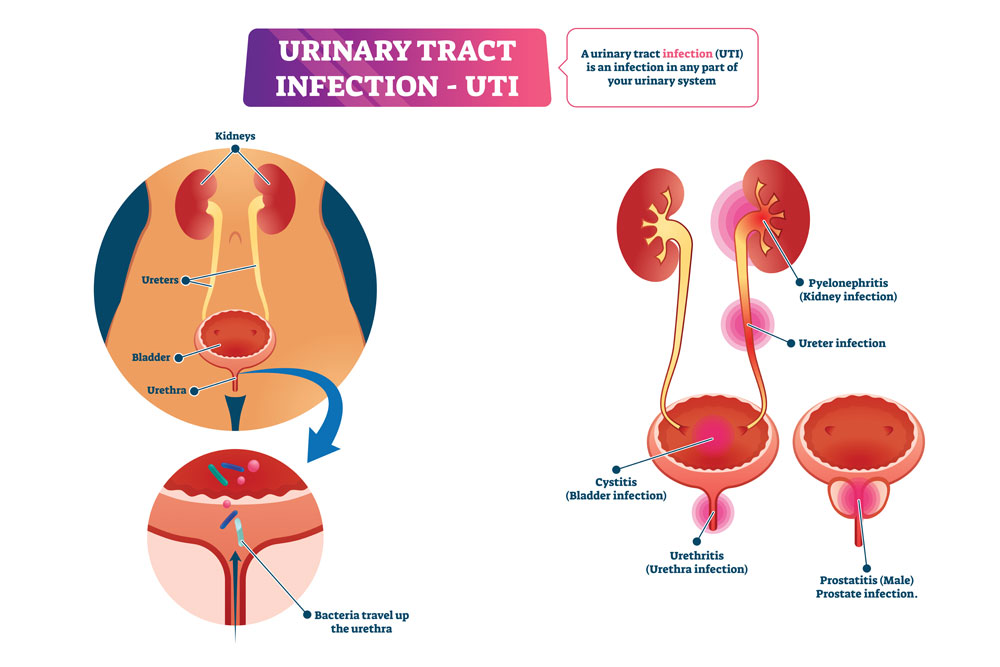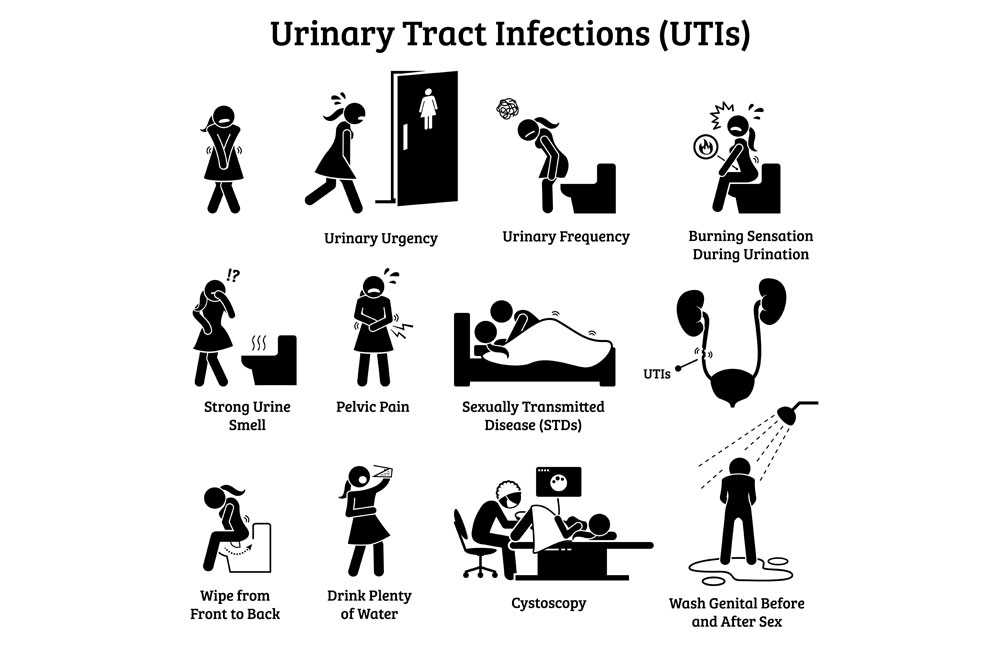It’s highly unlikely that anybody who knows anything about health today should be unaware of what a urinary tract infection (UTI) is. The World Health Organization (WHO) says that this infection, which is usually quite minor but can turn fatal if left untreated, causes around 8.3 million visits to the doctor’s office and more than one million hospitalisations in a year. A 2019 study in the journal Therapeutic Advances in Urology, titled An Introduction to the Epidemiology and Burden of Urinary Tract Infections, supports this by stating that UTIs are the most common outpatient infections in the world.
The same study also suggests that women are at a much higher risk, higher by 50 to 60 per cent in fact, of suffering from UTIs throughout their lifetimes. The prevalence of UTIs increases with age, with women above the age of 65 at approximately double the risk of contracting this infection. Clearly, the need to beware of the risks of UTIs and prevent them—and get them treated on an urgent basis—should rank high in the priority list of every woman. We talked to Dr Asha Dalal, the director of the department of obstetrics and gynaecology, Sir HN Reliance Foundation Hospital and Research Centre, Mumbai, and here’s everything she thinks you should know about UTIs.
What is a UTI?
“Urinary tract infections are infections involved with any part of the urinary tract, including the kidneys, ureters, the bladder, and the urethra,” Dr Dalal says. “The kidneys and ureters are parts of the upper urinary tract, and the bladder and urethra are parts of the lower urinary tract.” Depending on where the infection is located, the UTI is classified and treated accordingly. The following are the types of UTI based on this location:
• UTI in the kidneys is called nephritis.
• UTI in the ureters is called ureteritis.
• UTI of the bladder is called cystitis.
• UTI of the urethra is called urethritis.
Causes of a UTI
Dr Dalal points out that UTIs can occur at any age. “Commonly, the bacteria causing it is E.Coli, which comes from the large bowels, travels up the urethra, and can cause cystitis,” she says. “If left untreated, it can go on to infect the kidneys, which in turn can cause severe complications.” She also points out that sometimes, chlamydia and mycoplasma can also infect the urethra, causing UTI as a complication of a sexually transmitted infection (STI).

Risk factors for UTI
Since you can contract a UTI at any age, it’s important to beware of the risk factors involved. The following are the key risk factors for a UTI:
• Poor personal hygiene
• Frequent sexual intercourse, especially with different partners
• Women whose immune systems are weak, like diabetics
• Intake of antibiotics for a long time, which alters the flora of the bladder
• Using tampons and not dealing with them properly
• Using a diaphragm and spermicide as a contraceptive can cause irritation and a UTI
• Wiping from back to front after urination, or a bowel motion, which makes an infection easily possible
• Using irritating personal hygiene products, like those with fragrance or chemicals
• An abnormality in the development of the urinary tract
• Anything that causes incomplete evacuation of the bladder
• A catheter in the bladder for whatever reason
• Pregnancy
Common symptoms of a UTI
Dr Dalal says the following are the key symptoms of a UTI:
• A strong urge to urinate, and yet, not passing much urine.
• Severe pain or burning while passing urine.
• Urine which may be dark coloured or smelly.
• Pain in the lower abdomen.
• Fever with chills.
“If the infection has gone to the ureters and the kidneys, then you may experience the following symptoms,” Dr Dalal says.
• Fever with chills
• Lower abdominal, back, or flank pain
• Nausea and vomiting

Diagnosis and treatment
“A UTI is diagnosed by taking a history of the patient, and doing a routine urinalysis,” Dr Dalal explains. “Sometimes, an ultrasound, CT scan, or MRI may be required to assure there are no complications. Rarely, a cystoscopy may be required.” As for the treatment for UTIs, Dr Dalal explains that simple infections need to be treated with antibiotics. “A short course of a single dose for three-five days is good enough,” she says. “If it is more complicated, then longer treatment may be required, with a higher dose of antibiotics or even injectable antibiotics. Exactly which antibiotics you need will depend on your urine culture report.”
Here are some things you must keep in mind while recovering from a UTI:
• Drinking plenty of fluids and voiding or peeing frequently helps in flushing out the bacteria.
• Avoid having drinks containing citrus juices or caffeine, which will irritate the bladder.
• You may be given medication to relieve the bladder pain sometimes.
• Cranberry juice has been used as a home remedy. It is useful as it can help prevent an UTI.
Dangers of not treating a UTI
There are many complications which can be caused due to a UTI. This includes kidney infection, kidney failure, and even death. The following are the major dangers of not treating a UTI.
• It can become chronic.
• It can spread to ureters and kidneys, causing pyelonephritis.
• It can cause life threatening sepsis.
• In pregnancy, it can cause premature labour and delivery, low birth weight of baby, and also cause hypertension and anaemia in the mother.
Preventing UTIs
“Many times, UTIs can become chronic,” Dr Dalal points out. This is why taking preventive steps throughout your life is vital. Dr Dalal suggests the following:
• Drink plenty of fluids.
• Pass urine frequently.
• Wipe from front to back.
• Avoid the use of irritating personal hygiene products, like scented douches or soaps. Water and soap are fine.
• Change from a tampon to a pad for menstrual hygiene.
• Use proper sexual hygiene. Clean your genital area before sex if possible. Pass urine after intercourse to flush out any bacteria from the urethra.
• Always keep dry by using a cotton underwear.